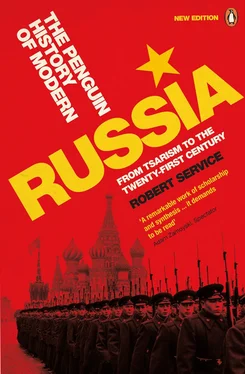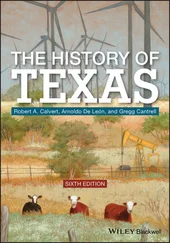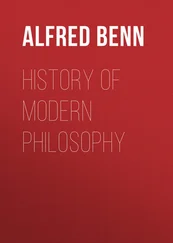Brest-Litovsk, Treaty of (1918), 75–6, 78–80, 84–6, 93, 102–3, 107, 173, 268, 326
Brezhnev, Leonid: career, 236, 383, 568; Khrushchëv sends to Kazakhstan, 338; as Khrushchëv’s protégé, 373, 383; and ousting of Khrushchëv, 376–8; administration, 379–80, 391, 397, 399–400; displaces Shelepin, 379; agricultural policy, 380, 400–403; avoids excessive repression, 382; qualities and background, 382–4, 404; as General Secretary, 385; visits Prague, 386; and Czechoslvak Spring, 387; Doctrine, 387–8; visits abroad, 388, 399; and nationalist aspirations, 390; and Party discipline, 391–2, 399; death and funeral, 397, 426–7, 435; foreign policy, 399; memoirs, 403; political appointments and promotions, 403; health decline, 404, 425–6; personal cult, 404; at 24th Party Congress, 405–6; and static policy, 409; and dissenters, 413; and repression, 415; and material improvements, 417; and ideology, 419; liking for popular entertainment, 421, 425; allows Jewish emigration, 423; and legality, 425; succession to, 426; appoints Andropov to head KGB, 429; and Gorbachëv, 437, 451; Yakovlev criticizes, 459; Yeltsin visits, 504; his post-Soviet reputation, 529
Brezhneva, Galina (Leonid’s daughter), 383, 426
Brezhneva, Viktoria (Leonid’s wife), 382
Britain: empire, 3, 96; in Franco-Russian entente, 3; Imperial Russian disputes with, 24; and German naval rivalry, 25; in World War I, 25, 78; intervenes in civil war, 102; diplomatic relations with USSR, 229; and outbreak of World War II, 255–7; conduct of World War II, 259, 272, 277; post-war status, 294; state welfare system, 294; resists reparation demands on Germany, 308; in Suez war (1956), 343
British Council, 557
Brodski, Iosif, 412
Bronshtein, Lev Davydovich see Trotski, Lev
Brusilov, General Alexei A., 30, 120
Brutus, 93
Buddhists, 369
budget: deficits, 467–8; balancing under Yeltsin, 510, 532, 535
Bukharin, Nikolai Ivanovich: agrees to 1918 peace settlement, 77–8; in Central Committee, 85; revolutionary aims, 92; administrative agreement with colleagues, 110; encourages German communism, 126; encourages popular education, 142; and Lenin’s health decline, 151; Lenin criticizes, 152; disagreements with Lenin, 153; and succession to Lenin, 154–5; attacks Trotski, 156; supports NEP, 156, 158, 162, 172–4; and Western powers, 158; on world capitalism, 159; economic policy, 160, 186–7; reviles critics, 161; and agricultural prices, 164, 173; opposes Stalin’s economic policies, 172–4; qualities, 173–4; conflicts with Stalin, 174–6; forced to condemn rightist policies, 178; dismissed from Politburo, 179; opposes compulsory collectivization, 179, 195; edits Izvestiya , 194; criticized at 17th Party Congress, 213; accused of espionage, 221, 223; arrested and tried, 223, 228, 240; denounced, 238; Khrushchëv and, 341, 348; rehabilitation, 459; historical accounts of, 479; The ABC of Communism (with Preobrazhenski), 142; ‘Notes of an Economist’, 173
Bukovina: annexed by USSR, 258
Bukovski, Vladimir, 412
Bulgakov, Mikhail, 248
Bulganin, Nikolai, 241, 337, 347, 352
Bulgaria: in Second Balkan War, 25; in World War II, 258; Soviet post-War award, 271; and formation of Cominform, 308; Gorbachëv and, 463; communist collapse in, 483
Bulletin of the Opposition (Trotski), 188
Burbulis, Gennadi, 512
bureaucracy: personnel, 145, 320; venality in, 145–6; and record-keeping, 147–8; Gorbachëv on, 438; see also administrators
Buryatiya, 521
Bush, George W., 555, 556
Bykaw, Vasil, 415
capital: foreign investments in Russia, 4, 159, 163; industrial, 79; inter-war instability, 170; invested abroad, 519; after communism, 550, 562
capital goods: in post-World War II economy, 303–4, 329; under Khrushchëv, 352, 373
capitalism: Bolsheviks oppose, 62; and industrial syndicates, 95–6; state, 97; under NEP, 144; communist belief in collapse of, 178, 254; post-World War II, 294; Stalin’s views on global, 322–3; Khrushchëv criticizes, 356, 362; and Gorbachëv’s market economy, 385–6; adapts to welfare economics, 398; Gorbachëv recognizes success of, 437; under Yeltsin and subsequently, 469, 514, 533–6, 539–42, 550–1, 553–4, 558, 562–3, 573
Carter, Jimmy, 411
Caspian Sea: pollution, 468
Castro, Fidel, 352, 374
Caucasus: national aspirations, 40; kulaks deported, 195; see also Transcaucasus
Ceauşescu, Nicolae, 483–4
censorship, 94, 324, 366, 380–81; see also samizdat
Central Asia, 84, 86
Central Control Commission, 118, 148, 176
Central Intelligence Agency (United States), 341
Central State Bank, 452
centralization, political, 98, 110–11, 115–17, 129, 169, 452, 521
cereals see grain
Chagall, Marc, 94, 139
Chaikovski, Pëtr, 11, 249
Chaliapin, Feodor see Shalyapin, Fëdr
Chalidze, Valeri, 382
Change of Landmarks (group), 128
Chazov, Yevgeni, 404
Chebrikov, Viktor, 438
Chechens, 114, 276–7, 288, 367, 545, 573
Chechnya: declares independence (1991), 421; war in, 533, 538, 546; and Putin 546, 547, 555, 566
Cheka (Extraordinary Commission): formed, 69, 74, 92, 227; in civil war, 103; repression and terror by, 107–8, 110; appointments to, 148; see also OGPU
Chelyabinsk, 103, 364, 468, 518
Cherkessk (Stavropol region), 286, 296
Chernenko, Konstantin, 403–4, 426, 428, 433–5, 442
Chernobyl: nuclear power station accident, 445–6, 457, 469
Chernomyrdin, Viktor, 515–16, 522–3, 526, 529–31, 534, 537, 544
Chernov, Viktor, 19, 36–7, 51, 105
Chernyaev, Anatoli, 486
Chernyshevski, Nikolai, 17
Chiang Kai-shek, 162
Chicherin, Georgi, 158
Children of the Twentieth Congress, 356, 364, 450
Chile, 389, 399
China: Russian rail concession in, 3; 1924 treaty with USSR, 159; communists massacred, 162; acknowledges Soviet hegemony, 295; communist power in, 311; Treaty of Friendship with USSR, 311; resents Soviet friendship with USA, 354; Khrushchëv criticizes ‘dogmatism’ in, 362; border skirmishes with USSR, 388; rapprochement with USA (1970s), 399–400; Albania supports, 409; Gorbachëv’s overtures to, 465; Yeltsin’s relations with, 538
Chinese Communist Party: Politburo directs, 162
Chita province, 550
Chkalov, Valeri, 247
Christianity: divisions and sects, 10–11, 13; separation from state, 90; Bolshevik treatment of, 136, 318; see also Orthodox Church
Chronicle of Current Events, The ( samizdat journal), 382
Chubais, Anatoli, 512–15, 522, 525
Chubar, Vlas, 226
Chuikov, Vasili, 265
Churchill, (Sir) Winston S.: warns USSR of German invasion, 259; as war leader, 263; meetings with Stalin, 268–71, 273; and dissolution of Comintern, 270
CIS see Commonwealth of Independent States
Civil Code, 145
civil rights, 400, 412–13, 479
Civil War (1918–21), 101–2, 106, 112–13, 116–17, 123–4, 143
class (social): and employment, 7, 97; divisions, 9, 239; and rationing system, 87, 95; conflict, 92, 101, 179, 206, 454–5
clergy see priests and clerics
clientelism, 278, 323, 360, 392, 541
coal industry, 4, 78
Cold War, 294, 312–13, 336, 465
collective leadership, 332
collectivism, 89, 332
collectivization: Lenin on, 92; in Ukraine, 109; Stalin introduces, 170, 172, 202, 250; compulsory, 179–82, 234; peasant resistance to, 179, 183–4; supervision of, 186; and death rate, 201; and wartime food production, 276, 286; maintained under German occupation, 287; in Eastern Europe, 309, 311; Ovechkin writes on, 320; Danilov writes on, 381; under Brezhnev, 400–401
Читать дальше












